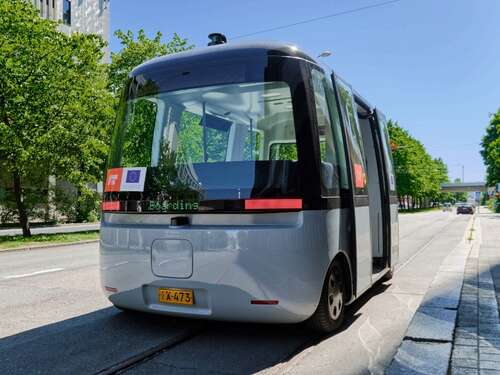
The two companies plan to combine their technology to bring two automated shuttles to Belfast’s Harbour Estate in 2025.
Oxa and eVersum have joined an £11m project that aims to bring a self-driving shuttle service to Belfast.
Self-driving software developer Oxa and electric commercial vehicle company eVersum have joined the Harlander Project, which aims to bring a fully automated shuttle service to Belfast’s Harbour Estate.
The two companies have announced their first joint roll-out of autonomous vehicle technology as part of this project. The goal is to initially deliver two self-driving shuttles that can carry up to 40 passengers each around Belfast’s Innovation District, as well as tourist attractions such as the Titanic Belfast exhibition.
The first shuttles are expected to enter passenger service in 2025. The partnership will combine Oxa’s self-driving software with eVersum’s vehicles. Each shuttle in the Belfast deployment will also have a human safety operator on board.
“With eVersum, we can deploy passenger-carrying autonomous shuttle fleets almost anywhere and these flexible forms of transport will become widespread as a way of moving people and goods in a safer, more efficient and faster way,” said Oxa CEO Gavin Jackson.
“The broader roll-out of self-driving vehicles is starting and shuttling can lead the way as the fastest evolving commercial arena for Oxa self-driving technology to make its mark internationally.”
The Harlander Project is part-funded by Innovate UK and the Centre for Connected and Autonomous Vehicles.
Self-driving tech
The tech behind self-driving cars has advanced significantly in recent years, causing regulators to take steps to prepare for their arrival. Last April, the UK revealed planned changes to its highway code to pave the way for fully self-driving cars to hit the roads.
This was followed by the European Commission sharing plans to allow 1,500 fully driverless vehicles per car model to be registered and sold in a member state each year.
However, some companies in the automotive sector have struggled to make self-driving cars a reality. Cruise, the self-driving vehicle business owned by General Motors, suffered a hit to its operations recently, as its permit to operate automated taxis in California was suspended.
The suspension followed a serious road incident last month, when videos emerged of a hit-and-run victim pinned under the back wheels of a Cruise robotaxi. Cruise shared details of the incident and said the hit-and-run victim was dragged 20ft under its driverless vehicle.
In a recent report involving alleged internal materials, The Intercept claims Cruise knew that its self-driving cars had problems recognising children and spotting holes in the road
10 things you need to know direct to your inbox every weekday. Sign up for the Daily Brief, Silicon Republic’s digest of essential sci-tech news.

